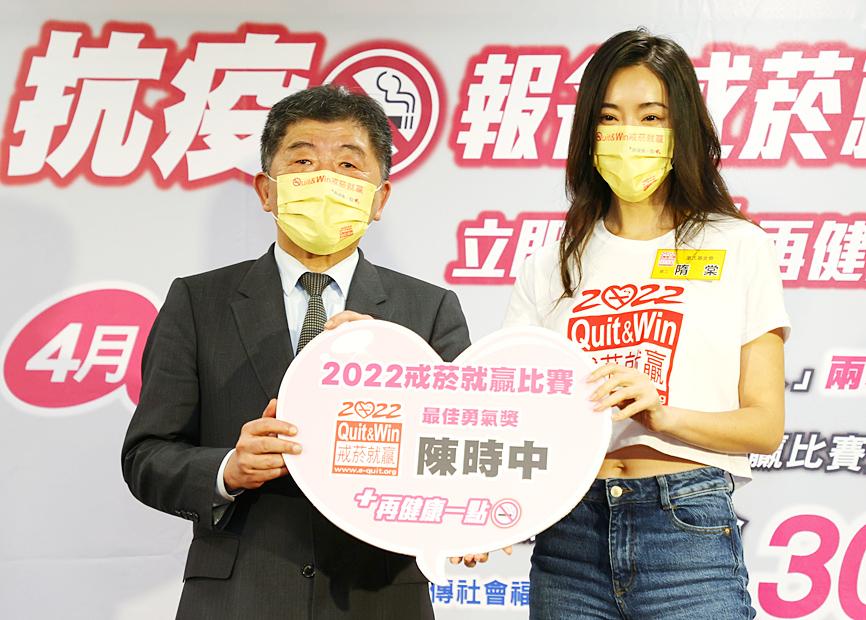Minister of Health and Welfare Chen Shih-chung (陳時中), who has been smoking for 52 years, yesterday signed up for the Health Promotion Administration’s (HPA) smoking cessation competition to encourage other people to quit smoking.
The minister announced his decision and signed a registration form at a news conference held by the HPA and the John Tung Foundation in Taipei yesterday to promote this year’s program.
Chen, who is 69, said he started smoking when he was 17, and even when Chang Po-ya (張博雅), then-minister of the now-defunct department of health, asked him to be the convener of the smoking cessation competition, he agreed, but did not want to give up smoking himself.

Photo: CNA
“I have attended many activities in recent years, but I feel most uneasy today, because it is very hard to make this decision,” he said. “I have been smoking for about 50 years, and I have never thought of quitting smoking, as I have always found excuses for smoking.”
However, Chen said he began thinking about giving up smoking because he received a telephone call from Lin Ching-li (林清麗), director of the John Tung Foundation’s tobacco division, about a month ago, encouraging him to quit, and she even wrote him a letter.
Chen said he is not sure he can succeed, but he would do his best in the hopes of encouraging smokers to take action.
The competition invites groups of two people — a competitor (smoker) and a witness (non-smoker) — to register before the end of next month. If the competitor can succeed in not smoking from May 2 to May 29, their group would be eligible for a lottery with a grand prize of NT$300,000.
The biannual competition has been held for 20 years, the foundation said, adding that the smoking cessation rate is about 70 percent after one month and about 35 percent after a year.
There are more health benefits for young people who quit smoking, so smokers should quit as early as possible, Chen said.
However, it is never too late to give up smoking, even for long-term smokers like himself, he added.

‘DENIAL DEFENSE’: The US would increase its military presence with uncrewed ships, and submarines, while boosting defense in the Indo-Pacific, a Pete Hegseth memo said The US is reorienting its military strategy to focus primarily on deterring a potential Chinese invasion of Taiwan, a memo signed by US Secretary of Defense Pete Hegseth showed. The memo also called on Taiwan to increase its defense spending. The document, known as the “Interim National Defense Strategic Guidance,” was distributed this month and detailed the national defense plans of US President Donald Trump’s administration, an article in the Washington Post said on Saturday. It outlines how the US can prepare for a potential war with China and defend itself from threats in the “near abroad,” including Greenland and the Panama

A magnitude 4.9 earthquake struck off Tainan at 11:47am today, the Central Weather Administration (CWA) said. The hypocenter was 32.3km northeast of Tainan City Hall at a depth of 7.3km, CWA data showed. The intensity of the quake, which gauges the actual effect of a seismic event, measured 4 in Tainan and Chiayi County on Taiwan's seven-tier intensity scale, the data showed. The quake had an intensity of 3 in Chiayi City and County, and Yunlin County, while it was measured as 2 in Kaohsiung, Nantou County, Changhua County, Taitung County and offshore Penghu County, the data showed. There were no immediate reports of

The Chinese Nationalist Party (KMT) is maintaining close ties with Beijing, the Democratic Progressive Party (DPP) said yesterday, hours after a new round of Chinese military drills in the Taiwan Strait began. Political parties in a democracy have a responsibility to be loyal to the nation and defend its sovereignty, DPP spokesman Justin Wu (吳崢) told a news conference in Taipei. His comments came hours after Beijing announced via Chinese state media that the Chinese People’s Liberation Army’s Eastern Theater Command was holding large-scale drills simulating a multi-pronged attack on Taiwan. Contrary to the KMT’s claims that it is staunchly anti-communist, KMT Deputy

RESPONSE: The government would investigate incidents of Taiwanese entertainers in China promoting CCP propaganda online in contravention of the law, the source said Taiwanese entertainers living in China who are found to have contravened cross-strait regulations or collaborated with the Chinese Communist Party (CCP) could be subject to fines, a source said on Sunday. Several Taiwanese entertainers have posted on the social media platform Sina Weibo saying that Taiwan “must be returned” to China, and sharing news articles from Chinese state media. In response, the Mainland Affairs Council (MAC) has asked the Ministry of Culture to investigate whether the entertainers had contravened any laws, and asked for them to be questioned upon their return to Taiwan, an official familiar with the matter said. To curb repeated